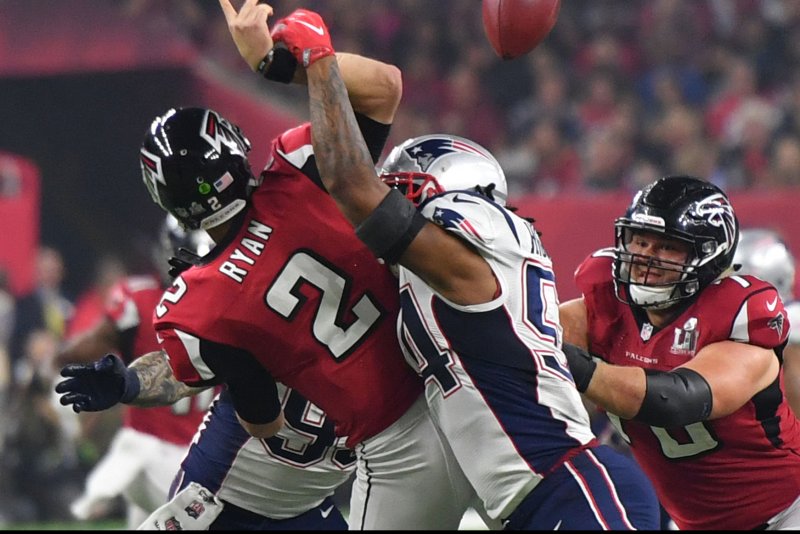1 of 3 | New England Patriots middle linebacker Dont'a Hightower (C) forces a fumble by Atlanta Falcons quarterback Matt Ryan (2) in the fourth quarter of Super Bowl LI at NRG Stadium in Houston on February 5, 2017. The Patriots came from behind to defeat the Falcons 34-28 in overtime. Photo by Kevin Dietsch/UPI |
License Photo
The Atlanta Falcons were one of the youngest teams to reach the Super Bowl, nearly won it but lost to an all-time great performance by an all-time great quarterback, and, you might think, left Houston well-positioned to make another championship run in 2017.
Don't count on it.
History tells us it has become increasingly difficult for teams to make that second climb up the mountain after losing the Super Bowl. It was not always that way; in fact, in the early years of the NFL's Roman numeral game, losers routinely came back to win soon after, sometimes the next year. Now, however, in an era of more intense pressure and scrutiny, it rarely happens.
Ernie Accorsi, a retired general manager who led the New York Giants to the Super Bowl and the old Cleveland Browns to the precipice, once explained the difference between then and now. Basically, it comes down to the scrutiny teams undergo when they lose.
Years ago, he said, a team would lose a big game, would get on its plane and come back home and perhaps a couple of local writers or broadcasters would ask a few questions and then move on.
Now, however, every game is magnified, every question seemingly is loaded with nuance, and the attention is much greater. In the case of the Falcons, perhaps even moreso because of their carelessness trying to protect a huge lead, with a coach who only two years earlier experienced what can happen against the New England Patriots if you're not careful.
Yes, as much as Kyle Shanahan can be faulted for the play-calling that led to sacks that kept the Falcons from clinching the game, it was incumbent on coach Dan Quinn to tell Shanahan to tone it down late in the third and in the fourth quarter. That's the head coach's job. Especially a head coach who saw what happened to his own team 104 weeks earlier, when he was with a Seattle team that threw a pass it should not have thrown instead of handing the ball to Marshawn Lynch at the goal line.
The Falcons are young enough to be resilient. Eight of their 11 defensive starters in the Super Bowl were in their first two years in the NFL. So maybe they can close their eyes, pretend it didn't happen or use it as a learning experience, and return next year fully prepared to make another championship run.
Perhaps.
But perhaps they will so damaged by the way their season ended, the young Falcons will have a hard time getting focused, psyched and prepared to undergo the mental and physical rigors of another climb through the NFL gauntlet. A quarterback named Dan Marino could tell them what happens when you lose a Super Bowl you expect to win early in your career, and count on getting another chance.
In the 1984 season, his second in the NFL, Marino threw 48 touchdown passes, at the time a record. But the Dolphins could score just one touchdown in the Super Bowl and were hammered by the San Francisco 49ers, 38-16. Marino played 15 more seasons, but never reached another Super Bowl.
Take a look at what happened to the Carolina Panthers, last year's Super Bowl loser, whose quarterback Cam Newton was supposed to be the Next Big Thing in the NFL. Newton's TD-interception ratio dropped from 35-10 to 19-14, his passer rating fell from 99.4 to 75.8, his rushing yardage fell from 636 to 359, and the Panthers, who were 15-1 in the 2015 regular season, were 6-10 in 2016.
Seattle, which lost the Super Bowl following the 2014 season (after winning the previous one), also has suffered a Super Bowl hangover. The Seahawks lost in the divisional playoff round the last two years.
Discounting New England, which has made the Super Bowl a regular part of its schedule with Bill Belichick and Tom Brady, the only team in the last quarter-century that lost a Super Bowl and returned to win one within five years was Denver, with Peyton Manning. The Broncos were crushed by Seattle in the Super Bowl following the 2013 season, but beat Carolina two years later.
In the early years of the Super Bowl, however, it happened all the time. Kansas City lost Super Bowl I and won Super Bowl IV. Baltimore lost Super Bowl III and won Super Bowl V. Dallas, which lost Super Bowl V, won the next year, beating Miami, which then won the next two Super Bowls. Dallas lost Super Bowl X but came back to win Super Bowl XII.
Certainly, Atlanta will be a favorite in the NFC in the 2017 season. But the Falcons will have to hope a new offensive coordinator, Steve Sarkisian, can help them put the Super Bowl disappointment aside, and they'll have to hope their young players can manage to climb that mountain again while putting aside the avalanche that ended the 2016 season.
It's not impossible, of course. But it doesn't happen very often anymore.
Ira Miller is an award-winning sportswriter who has covered the National Football League for more than five decades and is a member of the Pro Football Hall of Fame Selection Committee. He is a national columnist for The Sports Xchange.















